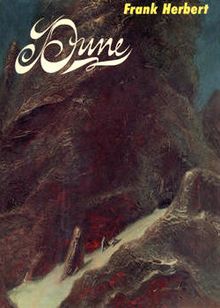Dune

November 29, 2021
When thinking of the thousands upon thousands of stories delving into the unknown, blasting aliens with future technology, and saving the universe, few have come close to the sci-fi masterpiece, Dune, by Frank Herbert. By the late 20th century, a combination of innovative filmmaking and plot adaptation reignited a swelling sci-fi genre by displaying the true exotic and unique flavors of futurism. Stories such as the renowned Star Wars allowed for readers to experience an atmosphere of suspense, excitement, and shock without the necessity of a deep understanding of text, a downfall that had slowed the genre’s growth in the past. However, as film exploded, so too did the revitalized writers who had so far been consigned to the near-shadows. Political thought bled into dozens of books and novels, providing a tantalizing and complex plot. An engineer of this “amalgam” sci-fi was the journalist-photographer-turned-author Frank Herbert. Utilizing his long bill of experiences writing across the US and interacting with an untold array of professional individuals, Herbert sought to write a book that would go down in history as a true work of futuristic art. By 1959, his idea was set, and by 1965 Frank Herbert achieved his goal.
Dune, a story of feudal intrigue, economic pressures, and religious complexity that netted some of the highest literary awards in America within its first years of publication. Dune’s plot revolves around a teenage boy by the name of Paul, heir to the mighty House Atreides, in a universe where imperial governance has returned in force. Thousands of worlds colonized by humans have been devolved into local principalities and duchies, all under the boot of the mighty Padishah-Emperor (a title derived from Persian monarchic tradition). Great Houses ruling over dozens of worlds weigh their collective power in the Landsraad – inspired by the Landtag in Prussia. The Landsraad and Padishah-Emperor are locked in an eternal struggle for power represented through their shares in the CHOAM, or Combine Honnete Ober Advancer Mercantiles, the one and only monopoly over Imperium trade. Paul’s story continues with his family being bestowed the titles to Arrakis (also known as Dune), home of the nomadic Fremen, by the Padishah-Emperor- a guise for a looming plot to undermine House Atreides.
On Arrakis, Herbert introduces a critical vessel upon which the plot of the Dune series revolves in its entirety. Melange, the geriatric poison-spice, fueled the Imperium with its unique capabilities. With consistent dosage, melange — also referred to simply as spice — can drastically increase the lifespan of its user and, in high enough doses, place the user in a state of omniscience where they can deduce the near future. The discovery and refinement of melange on Arrakis, its one and only producer-planet, allowed for the Spacing Guild of navigators to safely direct their space-folding ships to distant stars. In the first book of many, Dune incorporates several real-life elements to provide a historically-rooted story rich with references to the past. House Atreides is based on House Atreus, the mythological Greek house of Agamemnon and Meneleus, and House Harkonnen is more loosely connected to the common Finnish family name Härkönen. Furthermore, the major factions of Dune are all rooted in political, religious, and economic organizations and concepts seen in the 20th century and before. Frank Herbert spent his remaining years after 1959 investing life and soul into his beloved series, working on several stories at a time to churn out as much content as possible for his adoring fans.
On his death day, February 11th, 1986, the now wildly famous author had published six books of the Dune series, with several more partially drafted. His elder son, Briar Herbert, continued his legacy, finishing off several of his father’s incomplete drafts. Dune explores a world that has grown autonomous of its Creator, established layers upon layers of plot that has weaved a web truly resembling a future rooted in the past. A piece of a thousand pages could not cover the intricacies and implications of Frank Herbert’s — perhaps ingenious, perhaps not — unique approach of writing. Yet, it takes but one sentence to explain why Dune is so great, why it has become one of the most well-known books in the world: Frank Herbert is Dune.

